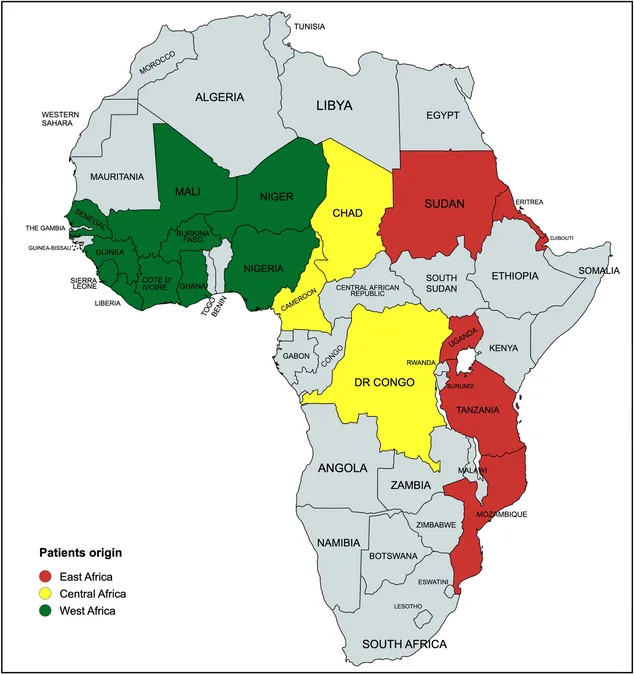
Unveiling the Hidden Threat: Anti-Malarial Drug Resistance Genes Discovered in Turkey Amid Rising Malaria Cases
2024-09-27
Background
Turkey has recently witnessed an alarming upsurge in imported cases of Plasmodium falciparum malaria—a disease that poses a significant risk to public health. To combat this resurgence and ensure effective treatment, understanding the genetic mutations related to anti-malarial drug resistance is critical. A groundbreaking study aimed to explore the mutations in pfmdr-1, pfcrt, and pfk13 genes among imported malaria patients within Turkey, offering invaluable insight into the nation's evolving malaria landscape.
Methods Overview
In this pioneering study conducted at Bakırköy Dr. Sadi Konuk Research and Training Hospital from 2017 to 2022, researchers examined 100 patients diagnosed with imported P. falciparum malaria. Utilizing archived blood samples and thin smear preparations, DNA was extracted and analyzed through advanced real-time PCR and sequence analysis to detect polymorphisms in the critical resistance genes.
Key Findings
The results were striking. A staggering 74.5% mutation rate was revealed in the pfmdr1 gene, with the emergence of five distinct haplotypes. Interestingly, mutations in the pfcrt and pfk13 genes were found to be significantly less prevalent, highlighting the complexity of resistance mechanisms. These findings underscore a worrying trend: as Turkey sees a rise in imported malaria cases, the need for enhanced monitoring and treatment strategies has never been more urgent.
Why It Matters Now
Malaria remains a fierce adversary worldwide, particularly in regions like sub-Saharan Africa where the disease wreaks havoc. The World Health Organization reported a significant increase in malaria fatalities, showcasing the devastating impact of this disease. In fact, Turkey, having achieved malaria elimination as recently as 2010, is now grappling with not only imported cases but sporadic indigenous infections, showcasing a dangerous reversal of progress.
The Evolution of Resistance
The relentless evolution of drug resistance in malaria is alarming. The study identified key mutations linked to chloroquine and artemisinin resistance, namely in the pfcrt and pfmdr1 genes. With reports of partial artemisinin resistance emerging in Africa, the threat of treatment failure looms large. Mutations in these genes ultimately lead to complications like recurrence of the disease, creating a cycle that is difficult to break.
Future Implications for Treatment
As Turkey navigates this budding malaria crisis, it is essential that robust genetic surveillance systems are implemented. These systems will not only enhance treatment effectiveness but also contribute to global efforts to eliminate malaria entirely. The data from this study could be instrumental in guiding local and international strategies, ensuring that healthcare systems are prepared to combat the increasing threat of drug-resistant malaria more proactively.
Conclusion: A Call to Action
With the continuing rise of malaria cases and evidence suggesting emerging drug resistance, Turkey stands at a critical juncture. This study serves as a clarion call for intensified research and healthcare efforts. The global fight against malaria—and the resistant strains that threaten effective treatment—depends on a collective response to these increasingly complex challenges. As the shadows of malaria loom large once more, vigilance and action are paramount to safeguarding lives in Turkey and beyond. This article reveals not only the immediate findings of a crucial study but also highlights the larger photo—monitoring anti-malarial drug resistance is vital for public health worldwide. With the stakes higher than ever, the survival of countless individuals hangs in the balance.




 Brasil (PT)
Brasil (PT)
 Canada (EN)
Canada (EN)
 Chile (ES)
Chile (ES)
 España (ES)
España (ES)
 France (FR)
France (FR)
 Hong Kong (EN)
Hong Kong (EN)
 Italia (IT)
Italia (IT)
 日本 (JA)
日本 (JA)
 Magyarország (HU)
Magyarország (HU)
 Norge (NO)
Norge (NO)
 Polska (PL)
Polska (PL)
 Schweiz (DE)
Schweiz (DE)
 Singapore (EN)
Singapore (EN)
 Sverige (SV)
Sverige (SV)
 Suomi (FI)
Suomi (FI)
 Türkiye (TR)
Türkiye (TR)